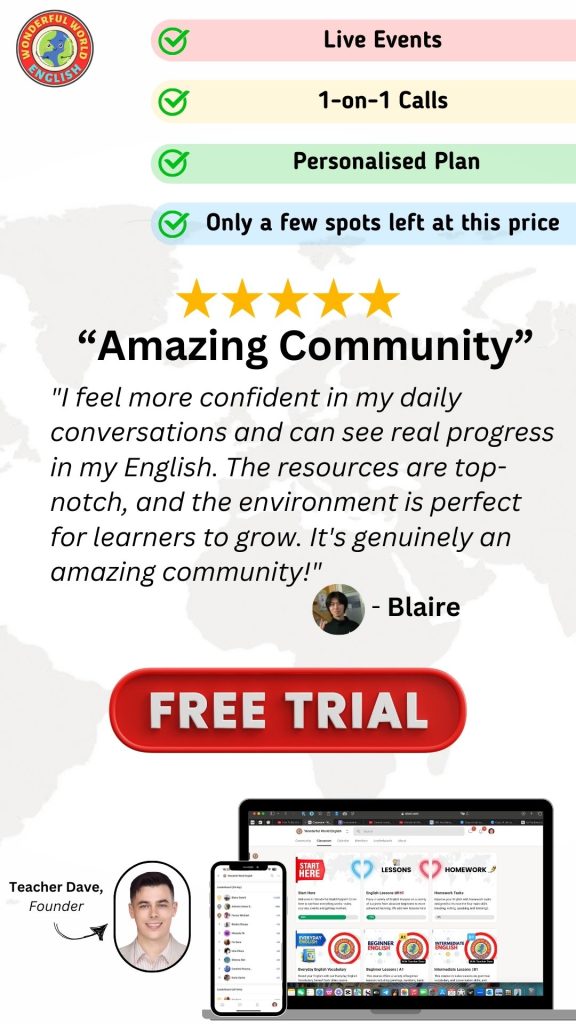Contents
Toggle
Meet David De’ Ath, founder, editor, and writer at Wonderful World English. With his extensive background as an English teacher, David provides valuable insights and practical tips on ESL for students and teachers alike.
Are you ready to take your English skills to the next level in 2025?
With countless resources available online, mastering English has never been more accessible.
But with so much information, where do you start? The secret lies in learning how to effectively research online.
Online research isn’t just about finding answers. It’s about discovering tools, tips, and communities that can accelerate your learning journey.
Whether you’re looking to improve your grammar, expand your vocabulary, or speak with confidence, the internet is your ultimate classroom.
In this article, you’ll learn how to harness the power of online research to master English.
From finding the best resources to turning knowledge into action, these practical strategies will guide you every step of the way.
1. Understanding the Importance of Online Research
Online research opens the door to endless possibilities for English learners.
It’s like having a library, classroom, and tutor all in one place—available whenever you need it.
Through online research, you can find:
- Grammar Lessons: Master the rules of English with tutorials and guides.
- Pronunciation Practice: Watch videos or use apps to sound more fluent.
- Real-life English Examples: Read articles, listen to podcasts, or watch videos to see how English is used in everyday life.
Why is this important?
Because learning English isn’t just about memorizing words or phrases—it’s about understanding how to use them in real-world situations.
Online resources help bridge this gap by offering authentic, up-to-date examples of English in action.
The best part? You’re in control.
You can choose what to learn, when to learn, and how to learn.
Whether you’re studying for an exam or improving your conversational skills, the internet provides endless opportunities to personalize your learning journey.
With the right approach, online research can become your most powerful tool for mastering English.
And in this article, we’ll show you exactly how to make it work for you.
2. Identifying Credible and Relevant Online Sources
The internet is full of resources for learning English, but not all of them are reliable or helpful.
To make the most of your time, you need to know how to find credible and relevant sources.
Start with trusted platforms that specialize in English education.
Websites like BBC Learning English, Cambridge Dictionary, and Grammarly Blog are excellent for grammar tips, vocabulary building, and writing guidance.
These platforms are backed by experts and updated regularly, ensuring high-quality content.
When looking for speaking and listening practice, turn to interactive resources like TED Talks or YouTube channels dedicated to language learning.
These platforms offer authentic examples of spoken English, helping you improve your pronunciation and listening comprehension.
For reading practice, explore news websites like The Guardian or National Geographic.
These not only expose you to advanced vocabulary but also keep you updated on global topics, making your learning experience practical and engaging.
How to spot a credible source:
- Check the author’s background. Are they experienced in teaching or using English?
- Look for updated content. Outdated materials may not reflect modern language use.
- Avoid overly casual or opinion-based sources that lack educational value.
Organizing your resources is just as important as finding them.
Use tools like Notion or your browser’s bookmark feature to save your favorite websites and articles.
This makes it easy to revisit valuable content without wasting time searching again.
By focusing on reliable and relevant sources, you’ll build a strong foundation for mastering English while avoiding common pitfalls of misinformation.
The right resources are out there—it’s all about knowing where to look and how to use them effectively.

3. Techniques for Effective Online Research
Searching the internet can be overwhelming, but with the right techniques, you can find exactly what you need to improve your English skills.
Here’s how to make your online research more effective and efficient.
1. Use Smart Search Queries
When using search engines, be specific with your queries. Instead of typing “learn English,” try something like “free online English grammar exercises for beginners” or “how to practice English pronunciation.”
Adding keywords like “PDF,” “video,” or “examples” can help narrow your results.
2. Explore Specialized Platforms
Join communities and forums where English learners and teachers share tips and resources.
For example:
- Reddit (r/EnglishLearning): Ask questions and get advice from others.
- Quora: Find answers to specific English-learning challenges.
- Language Exchange Platforms: Connect with native or fluent speakers to practice conversation.
3. Use Advanced Search Filters
Many search engines and websites allow you to filter results by date, type, or relevance.
Use these features to find the most up-to-date and tailored content.
For example, filter for videos if you want to improve your listening skills or blogs for reading practice.
4. Leverage Free Online Tools
Maximize your learning with tools like:
- Google Scholar: Find academic articles for advanced learners.
- Linguee: Search for word usage in real sentences.
- Forvo: Hear native speakers pronounce words.
5. Create a Personal Learning Library
Save and organize useful links in apps like Pocket, Evernote, or your browser’s bookmarks.
Create categories like “Grammar,” “Speaking Practice,” or “Exam Preparation” to keep everything neat and accessible.
By using these techniques, you’ll save time and uncover the best resources to meet your specific English-learning goals.
Researching effectively is a skill that grows with practice, just like English itself!
4. Leveraging Online Tools and Applications
Technology has revolutionized how we learn languages.
By using online tools and apps, you can turn your English-learning goals into a fun and efficient journey.
Here’s how to make the most of them:
1. Build Vocabulary with Language Apps
Apps like Duolingo, Memrise, and Quizlet are perfect for learning new words and phrases.
They offer engaging activities like flashcards, quizzes, and daily challenges that help you remember vocabulary more effectively.
2. Practice Speaking and Listening
Use platforms like iTalki and HelloTalk to connect with native or fluent English speakers.
These tools allow you to schedule lessons or casual chats to practice your speaking and listening skills in real-life situations.
For pronunciation, apps like Elsa Speak and Forvo are excellent resources.
3. Write and Get Feedback
Improve your writing skills with tools like Grammarly and ProWritingAid, which provide instant feedback on grammar, spelling, and style.
For more interactive practice, join writing forums where others can review and critique your work.
4. Watch and Learn
Platforms like YouTube and TED offer videos tailored to English learners.
Subscribe to channels that focus on English pronunciation, vocabulary, and culture to gain a deeper understanding of the language.
5. Test and Track Your Progress
Use online tests, such as those available on Cambridge English or EF SET, to evaluate your level and see how much you’ve improved.
Some apps, like LingQ, also track your learning stats, motivating you to stay consistent.
6. Create a Personalized Learning Experience
Combine tools that fit your goals.
For example, pair a grammar app with a speaking platform to practice what you learn.
This ensures that you’re building a well-rounded skill set.
Online tools and apps are like having a personal tutor in your pocket.
With consistent use, they can transform your English-learning journey and make it more interactive, enjoyable, and effective.
Do you want a personalised study plan?
Click the link below and sign up to our community and we will make one for you!

5. Staying Motivated and Consistent
Learning English is a marathon, not a sprint.
Motivation and consistency are key to reaching your goals. Here’s how you can stay on track:
1. Set Clear and Achievable Goals
Break your learning into small, manageable steps.
For example, aim to learn five new words a day, complete one grammar exercise, or have a 10-minute conversation in English each week.
Tracking progress with specific goals keeps you motivated and focused.
2. Create a Study Schedule
Consistency is more important than cramming.
Set aside time daily or weekly for English practice, even if it’s just 15–30 minutes.
Use digital calendars or reminder apps to stick to your schedule.
3. Join a Community for Support
Learning with others can make a big difference.
Join an online community, like Wonderful World English, where you can share goals, ask questions, and celebrate progress with people on the same journey.
A supportive group will keep you motivated during tough times.
4. Make Learning Fun
Incorporate activities you enjoy into your studies.
Watch movies or TV shows in English, play language-learning games, or listen to music and podcasts.
Engaging with the language in enjoyable ways helps you stay interested and committed.
5. Reward Yourself for Progress
Celebrate milestones, no matter how small.
Finished a lesson? Treat yourself to something you enjoy.
Reaching a goal deserves recognition and keeps you excited for the next step.
6. Embrace Setbacks as Part of the Process
Mistakes are a natural part of learning. Instead of getting discouraged, view them as opportunities to grow.
Reflect on what went wrong, seek help if needed, and keep moving forward.
Staying motivated and consistent doesn’t have to be hard.
By combining structure with activities you love, you’ll maintain your enthusiasm and make steady progress toward mastering English.

6. Turning Research into Action
Researching English-learning resources online is just the first step.
To truly master English, you need to apply what you’ve learned.
Here’s how to turn your research into actionable steps:
1. Practice New Vocabulary Daily
When you come across new words, don’t just memorize them—use them!
Write sentences, create flashcards, or incorporate them into conversations.
Tools like Quizlet can help you review words effectively.
2. Imitate Real-life Examples
After watching videos or reading articles, mimic what you’ve seen.
Practice repeating phrases or summarizing the content aloud.
This reinforces pronunciation, grammar, and fluency.
3. Write Regularly
Apply grammar rules and vocabulary by writing daily.
Start with short journal entries, emails, or even social media posts in English.
Use feedback tools like Grammarly to spot and fix mistakes.
4. Engage in Conversations
Join online forums or language exchange platforms to practice speaking.
Look for opportunities to interact with fluent or native English speakers.
Practicing aloud is one of the best ways to internalize new knowledge.
5. Complete Interactive Exercises
Take quizzes, complete worksheets, or participate in gamified activities that align with what you’re studying.
Websites like BBC Learning English or Khan Academy offer interactive lessons to make learning fun.
6. Track Your Progress
Use learning apps or journals to monitor your improvement.
Set goals like mastering a grammar topic, increasing your vocabulary, or completing a listening task.
Progress tracking helps you stay motivated.
7. Review and Reflect
Regularly revisit your research to refresh your memory.
Reflect on what’s working well and where you need improvement.
Adjust your strategies accordingly.
By actively applying what you learn online, you transform knowledge into skills.
The key is consistent practice—turn every bit of research into a step forward in your English-learning journey.
7. Overcoming Challenges in Online Research
While online research can be a powerful tool for mastering English, it’s not without its challenges.
Here’s how to tackle common obstacles and stay on track:
1. Managing Information Overload
The sheer volume of resources available online can be overwhelming.
To avoid this, focus on quality over quantity.
Prioritize credible websites and apps that align with your goals.
Create a short list of go-to resources to simplify your study routine.
2. Filtering Out Irrelevant Content
Not all online content is useful for English learners.
Use specific keywords in your searches, such as “English grammar for beginners” or “advanced speaking tips.”
This will help you find content tailored to your level.
3. Staying Focused
The internet is full of distractions.
To stay focused:
- Use website blockers to avoid social media while studying.
- Set a timer for study sessions (e.g., 25 minutes of focused research with a 5-minute break).
- Study in a quiet, distraction-free environment.
4. Avoiding Outdated or Misinformed Sources
Language evolves, and outdated materials can lead to confusion.
Check publication dates and rely on trusted platforms like Cambridge English, BBC Learning English, or reputable ESL blogs.
5. Balancing Research and Practice
Spending too much time researching without applying what you’ve learned can hinder progress.
Dedicate equal time to practicing speaking, writing, and listening.
For example, after researching vocabulary, use it in sentences or conversations.
6. Managing Time Constraints
Busy schedules can make it hard to fit in research.
Break learning into small, manageable chunks.
For instance, spend 10 minutes daily reviewing a new resource or completing an activity.
By addressing these challenges, you’ll make your online research more effective and enjoyable.
With focus and a clear strategy, you’ll navigate the vast world of online resources and use them to master English with confidence.

Conclusion
Mastering English in 2025 is within your reach, and online research is the key to unlocking your full potential.
The internet offers an abundance of tools, resources, and opportunities to tailor your learning journey and overcome challenges.
By identifying credible sources, using smart research techniques, and leveraging powerful apps, you can build your vocabulary, refine your grammar, and boost your confidence in speaking and writing.
Remember, it’s not just about collecting information—it’s about taking consistent action and applying what you’ve learned to real-life situations.
Stay motivated by setting clear goals, joining supportive communities like Wonderful World English, and celebrating your progress along the way.
When challenges arise, embrace them as part of the process and use them as opportunities to grow.
The journey to English mastery doesn’t have to be a solo effort.
By joining a community of learners and using the strategies shared in this article, you’ll stay inspired, supported, and on track to achieve your goals.
Take the first step today—start your online research, apply what you learn, and unlock a world of opportunities through English.
Ready to make 2025 the year you master English?
Join the Wonderful World English Skool Community and let’s reach your goals together!





